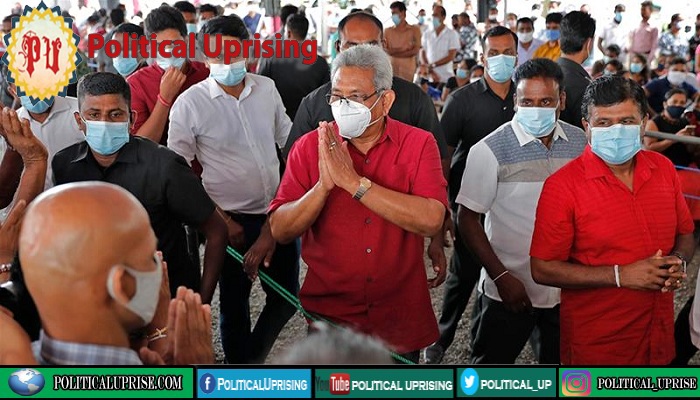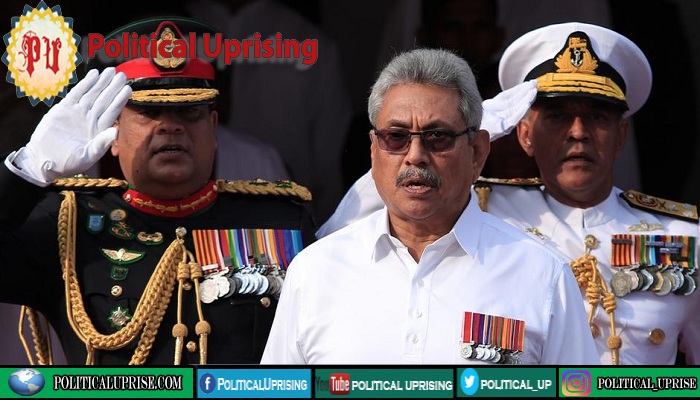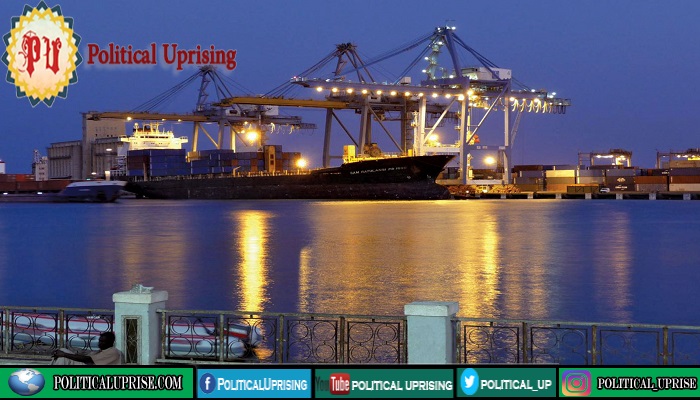Sri Lankan president Gotabaya Rajapaksa aims to consolidate power in key polls amid coronavirus and looming economic crisis.
Sri Lankans are set to vote in a parliamentary election in which President Gotabaya Rajapaksa, facing a fractured opposition, is widely expected to consolidate his power, a result rights groups warn could lead to deepening authoritarianism in the island nation.
More than 16 million voters are eligible to go to the polls when they open at 7am local time (01:30 GMT) on Wednesday, with Parliament’s 196 directly elected seats in 22 multi-member districts up for grabs.
Parliament’s remaining 29 seats will be filled by proportional representation based on the results of Wednesday’s poll.
President Gotabaya Rajapaksa’s brother, former president Mahinda Rajapaksa, leads the brothers’ Sri Lanka Podujana Peramuna (SLPP) party and his youngest brother, Basil, leads the Sri Lanka People’s Freedom Alliance (SLPFA) coalition under which the SLPP and its allies are contesting this poll.
Mahinda Rajapaksa, the eldest brother, is the SLPP’s prime ministerial candidate. He took over as caretaker prime minister in November, after Ranil Wickremesinghe of the opposition United National Party (UNP) resigned from the post following his party’s humiliating defeat in the presidential election.
The UNP has seen deepening divisions since that presidential poll, with party leader Wickremesinghe refusing to hand the reins to the party’s 2019 presidential candidate, Sajith Premadasa.

Premadasa, leader of the opposition in the outgoing parliament, broke away from the UNP, forming the Samagi Jana Balawegaya (SJB) in February, taking most UNP members of parliament with him.
Other major parties expected to win seats in the election include the left-wing Janatha Vimukthi Peramuna, led by Anura Kumara Dissanayake, and the Tamil National Alliance, led by Rajavarothiam Sampanthan.
In total, more than 7,452 candidates are running, representing 70 officially recognised political parties, according to the country’s Election Commission.
Rajapaksas’ SLPP is in pole position going into the election, analysts say, as the party is carrying momentum from a landslide win in last November’s presidential, which saw Gotabaya Rajapaksa elected.
Facing a fractured opposition, and boosted by widespread public support for Sri Lanka’s robust response to the COVID-19 crisis, the Rajapaksas have consolidated their hold on power in the last nine months and have campaigned on a platform asking voters to give them a two-thirds majority that would allow them to amend the constitution.
“The projection of the government’s campaign is about strong and decisive leadership, they are contrasting themselves with the [previous] government,” says Paikiasothy Saravanamuttu, executive director of the Colombo-based Centre for Policy Alternatives (CPA) think-tank.
“They are saying that they will act decisively in any crisis and can be trusted, and they have looked to the COVID19 crisis as an example of their ability to be able to manage things.”
Sri Lanka, a country of 22 million people, has had just 2,823 cases of the coronavirus since the outbreak began, with 11 deaths, according to official data. The data has, however, been disputed by critics of the government.
Ahilan Kadirgamar, a political economist at Jaffna University, says that the crisis has given the government another advantage, as the intermittent curfews and control over police and military enforcement may have given the SLPP an advantage during campaigning.
“Given the COVID-19 crisis, the lockdown, the social distancing, the government has an advantage because they are in control of state power,” he says.
Alan Keenan, senior consultant on Sri Lanka for the International Crisis Group (ICG), says there are widespread expectations that the SLPP will be able to gain the two-thirds majority required to amend the constitution a long-standing Rajapaksa campaign promise.
“They almost certainly won’t get it on the single vote, but if they get close enough, they may be able to buy over other candidates with ministerial positions or other perks, or monetary inducements,” he said.
“The odds are that they will get the two-thirds majority in the next month or two.”
Since the presidential election last year, the Rajapaksas have vowed to repeal parts of the country’s 19th amendment, a wide-ranging constitutional amendment that reduced the powers of the directly elected president and distributed them more evenly to the country’s prime minister, who is a member of parliament, and to other democratic institutions.
Since coming to power, Gotabaya Rajapaksa, the country’s former defence minister credited with ending the three-decade civil war against Tamil separatists, has centralised power and appointed a number of serving and former military officers to key bureaucratic positions.
He has been accused of committing war crimes during the brutal military campaign against the Tamil rebels.
“There is a kind of parallel government going on,” says Saravanamuttu. “There is a relative disregard for the laws and conventions of parliamentary practice.”
In March, Rajapaksa dissolved Parliament ahead of planned elections in April, which were later postponed due to public health concerns about holding a general election during the COVID19 pandemic.
Two months later, the country’s Supreme Court ruled in a key challenge to Rajapaksa’s power, declaring that the parliament could remain dissolved until the election could be held. The president has been ruling since March without parliamentary oversight.
“That shifts the balance of power to Gotabaya because he is able to act by decree, using his presidential task forces and various other mechanisms to effectively run things directly from the president’s office,” says Keenan from the ICG.
Those developments have left Mahinda Rajapaksa, a former two-term president, relatively powerless in the interim, analysts say, and there has been talk of tension between the brothers over just how deep any constitutional changes that would take prime ministerial powers away would go.
“There is certainly some degree of tension between the interests of the PM Mahinda and his brother, President Gotabaya,” says Keenan.
“If you have a system that is currently roughly balanced in terms of powers, will Mahinda really put his weight behind a change that would limit his power?”
Ahead of Wednesday’s poll, 10 international rights groups including Amnesty International, Human Rights Watch and Reporters Without Borders called on Sri Lanka’s government to “end the targeted arrests, intimidation and threats against the lives and physical security of lawyers, activists, human rights defenders and journalists”.
“A campaign of fear has intensified since the 2019 presidential election, and has cast a shadow over the 2020 parliamentary election campaign,” read the joint statement.
Amnesty International says President Gotabaya Rajapaksa’s government has, in addition to centralising power, also subjected those who express dissent to a campaign of harassment and arrests.
“Amnesty started recording such incidents and started sounding off alarm bells as early as two months into the new administration’s tenure,” Thyagi Ruwanpathirana, South Asia Researcher at Amnesty said.
“Journalists were being threatened and attacked, while human rights organisations started getting unscheduled visits from law enforcement authorities. Sometimes threats and intimidation came from civilian quarters, but there was no action taken, which guaranteed impunity for those who were doing the government’s bidding.”
The joint statement from rights groups detailed several examples of the crackdown, including the dismissal of academics critical of the government, harassment and arrests of lawyers working on enforced disappearance cases and the arrests, surveillance and interrogation of journalists.
One of the most notable cases has been that of Hejaz Hizbullah, a lawyer who has represented victims of rights abuses, who was arrested in April under the Prevention of Terrorism Act in connection with the 2019 Easter Sunday bombings.
Hizbullah, a prominent rights lawyer, had joined others a day earlier in submitting a letter protesting against a government order that mandated the cremation of all patients who die from COVID-19, a move seen by the Muslim community as a denial of its burial rights and in contravention of World Health Organization guidelines.
During the election campaign, SLPP supporters and allied parties have often used divisive ethnic language, observers say, when calling for votes, running on a platform that appeals to Sinhala Buddhist nationalism.
The use of hate speech in election campaigning has been lower in the run-up to this poll than the 2019 presidential election, Sri Lanka‘s Centre for Monitoring Election Violence (CMEV) says, but there have still been significant exceptions.
The CMEV documented 11 “notable” incidents of hate speech, most of which were stoking fears of, or calling for violence against, Muslim and Tamil minorities among Sinhala Buddhist voters, who form more than 70 percent of the population.
Whichever way the politics go, there are choppy economic waters ahead for Sri Lanka.
According to the World Bank, the island nation’s GDP is expected to contract by as much as 3 percent in 2020, mainly due to the coronavirus pandemic.
Heavily dependent on tourism, the Sri Lankan economy has seen the number of visitors plummet this year, after a similarly weak year in 2019 following the Easter Sunday bombings last April that left 260 people dead.
Slowing global economic growth has also seen a fall in expatriate Sri Lankans’ remittances, putting further strain on both the economy as a whole and the country’s balance of payments in particular.
Remittances in the first five months of 2020 dropped by 11.9 percent compared with the year before, according to Sri Lankan central bank data.
Alongside the dropping remittances and a slowing economy, a balance-of-payments crisis is looming in a country where imports are high and major foreign debt repayments will be due in the coming months.
“COVID19 has pushed us over the cliff, but the crisis has been in the making for some time,” says Kadirgamar from Jaffna University. “We are in trouble in terms of our balance of payments, with our imports almost double our exports, and we have normally bridged that through tourism and foreign remittances, and also through mounting external debt.”
Kadirgamar said the government “does not have a plan” to deal with the crisis, and that opposition parties, too, have not offered a coherent strategy to deal with the situation.
“The key issue is going to be how the government is going to react to its own constituency when things get a lot worse,” says Saravanamuttu, of the CPA. “Will it be ham-fisted and send in law enforcement and security forces to control dissident elements, or do they really have a policy with regard to the economy?”
Kadirgamar, too, fears possible fallout from the economic crisis in the months ahead, given the ethnically divisive rhetoric of the Rajapaksas’ SLPP and its allies.
“They are continuing to fan those flames, and that’s worrying because, given the kind of very serious economic crisis that we are facing, that will deepen and lead to more dispossession and economic suffering,” he says.
“Given the government doesn’t have an approach and, to be fair, there are very few possibilities of addressing it there are dangers that the minorities, the Muslims, become the scapegoat for even those kinds of problems.”
Either way, analysts agree that the current poll does put Sri Lanka at a political crossroads.
“I really do think that Sri Lanka is on the verge we have already seen the emergence of a very different style of governance, a very explicitly authoritarian, highly militarised, explicitly Sinhala Buddhist government that repeatedly ignores its own rules, regulations and procedures to assert itself, and has made clear it will truck no dissent from the media or opposition or civil society,” says Keenan.
“If that gets consolidated in lasting ways, then we are potentially entering a distinctive political formation in Sri Lanka.”



